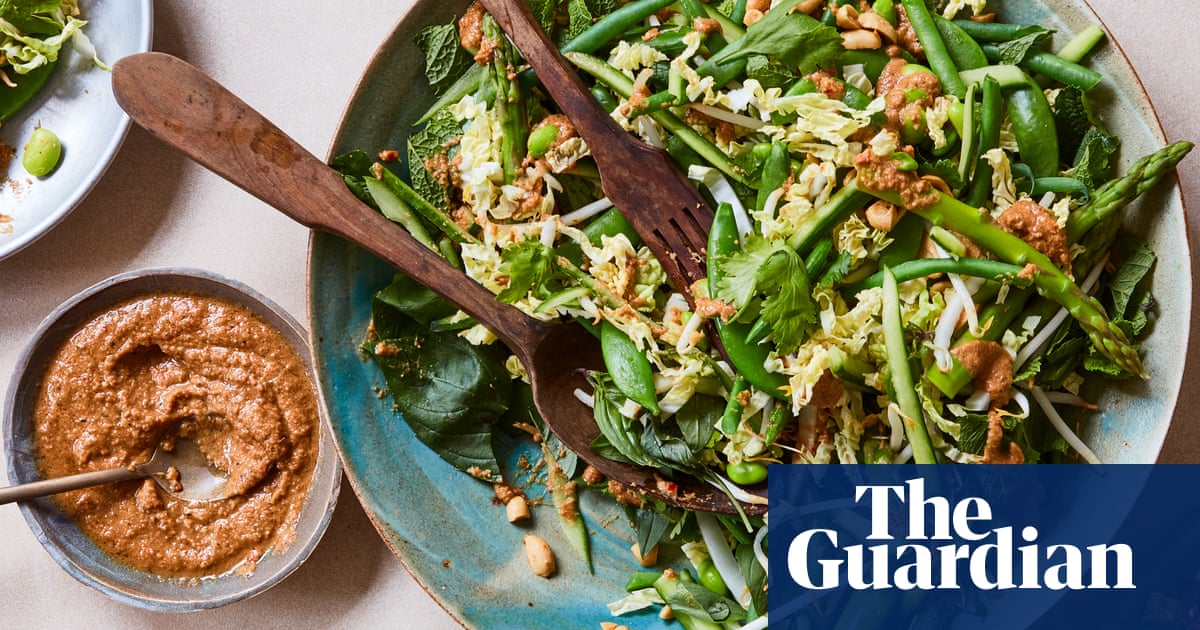
“You always want to be hitting the four Ss, which are sweet, salty, sour, and spicy,” says Sebby Holmes, head chef/patron of Farang, a Thai restaurant in north London. “If you have a balanced combination of all those things, people are going to love it.”
Spring brings with it a host of new veg and salad leaves, so you’ll want a nice, fresh dressing to match. Nahm jim would be just the ticket, Holmes says: “In a mortar, pound coriander root – or, if you can’t find it, some coriander stems – garlic, long red or green chillies [or bird’s eye, if you like more heat, or a combination of the two], and a bit of salt, to make a paste.” Into that goes fish sauce (or seaweed sauce or soy sauce, depending on preference), lime juice, mandarin, clementine ororange juice, and a little palm or caster sugar. Use this mix to cure fish (“prawns, sea bass and salmon all work well”), then get a selection of mint, coriander, Thai basil and some fresh fruit, such as pomegranate. “Mix that cured fish through the salad and serve with steamed sticky rice.” For vegetarians, Holmes would combine the same sauce with cooked glass noodles. “Get some sweet-and-sour fruits in there, too, plus wild garlic (if you can get hold of any), mint and coriander, and pour over the dressing.”
Another easy, versatile option to keep in your back pocket comes from Pranee Laurillard, founder of Giggling Squid restaurant chain and author of the book with the same name. Get a jam jar and add three tablespoons of coconut oil, a teaspoon of sesame oil, two teaspoons of soy sauce, a tablespoon of apple cider vinegar, a little honey and a pinch of chilli flakes. Screw on the lid, shake and job done. “It’s so quick, and you can then put it on any salad leaves, or on beetroot, courgette or carrots.” Otherwise, for Laurillard, it has to be papaya salad: “Pound garlic and chilli in a mortar, then add tomatoes, fermented fish sauce and lime juice. Mix, then add shredded papaya.” Eat just as it is, with plenty of herbs such as coriander on the side, or serve with grilled chicken and sticky rice.
Some traditional dipping sauces can be “let out” with oil to turn them into salad dressings, Holmes says. A good bet would be to toss long red chillies and peppers (skin on) in oil, add salt and roast on a barbecue or in the oven until soft. “Blitz them in a food processor [or use a stick blender] with vinegar, palm sugar and soy sauce, and the residual oil from the roast peppers and chillies amalgamates to become this vibrant, glowing colour.” This pairs particularly well with pork belly, grilled prawns and fried potatoes; otherwise, just loosen with oil and use to dress roast veg.
If you feel confident enough to dust off the barbecue, Holmes would get some tomatoes, galangal, lemongrass, long red chillies, bird’s eye chillies, banana shallots and garlic on that grill rack. “Roast all of that – with the skins on, if they have them – then, once done, peel off and discard the skins and pound the flesh into a chunky relish.” Chop up a selection of salad (cucumber, chicory, radicchio, iceberg lettuce, say) and fruit (“in Thailand, they eat young fruit such as green mango and green jackfruit like vegetables”) into bite-sized pieces, ready to dunk in the smoky relish. “It is more spring/summer, but why not?” Holmes adds. “After all, it’s been a long winter.”












